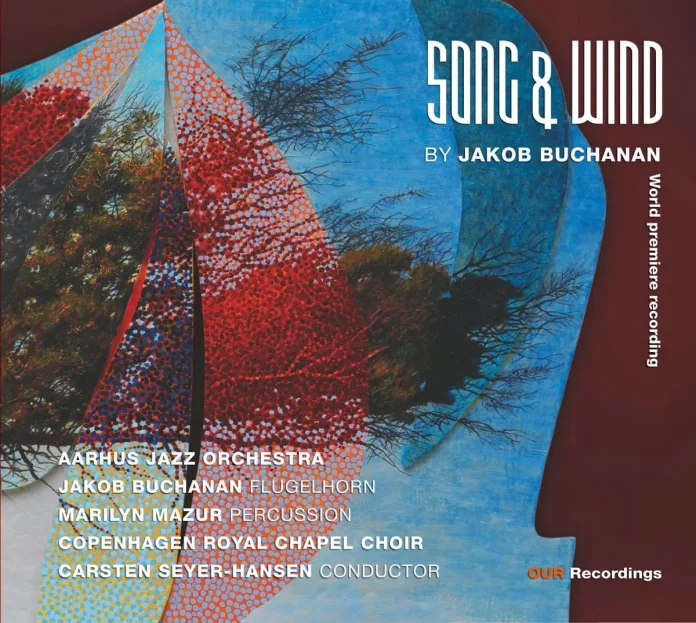“One moment your life is a stone in you, and the next, a star” wrote Rilke in The Book Of Pictures (1902-1906). Apt words, these, to introduce this latest work from the questing Danish composer and brass man Buchanan. As weighty as it is ethereal, as atemporal as it is diversely sprung rhythmically, Song & Wind is a splendid addition to and extension of the Davis-Evans axis in classically inflected jazz.
Born in 1968 in Viby, Jutland, Buchanan (t, flh) has built an extensive international reputation as player and composer, cross-genre explorer and educator. His first quartet included Jakob Bro and Marilyn Mazur and his CV includes work with, a. o., John Tchicai, Norma Winstone, Thomas Morgan, Mats Eilertsen, Julian Argüelles and Chris Speed. A thoughtful and melodically oriented player, he is here heard on flugelhorn throughout: sample the depth and range of his expressive sound, dynamics and phrasing on Prelude, or relish the tempered strength of his smoking lines on the curiously titled The Stones Make Sand Slow.
Song & Wind is Buchanan’s fourth major recorded orchestral work to date. Commissioned and performed by the excellent Aarhus Jazz Orchestra and the equally distinguished Copenhagen Royal Chapel Choir, it features Mazur extensively – and subtly: witness the burgeoning impact of her “world-creating” figures in Prelude or the elegant power of the rolling impetus and colour she brings to the development of the aforementioned The Stones.
The five-part, seven-track suite is rich in voicings which can project both a fragile tenderness, courtesy of, e.g., hovering clarinet and flute figures, and potent blocks of brooding, ominous strength, from the four-flugelhorn, four-trombone brass section. A further – and essential – dimension is supplied by the Royal Chapel (Boys) Choir, conducted by Carsten Seyer-Hansen, which interprets the existentially inflected thoughts of the South African writer Iain S. Thomas. Reproduced in the handsome accompanying booklet, Thomas’s chiselled reflections on the time-bound and eternity, the ethical issues of human life and the unfathomable vastness of nature gave Buchanan initial inspiration for the suite.
There is appreciable melancholy here, as befits Thomas’s primal concerns. But there is also leavening joy. Hear the emergent groove of The Stones or the way Mazur caresses and drives the concluding, airy and (both spiritually and musically) affirmative Rain Falls, with its fine solos from Buchanan and Royal Chapel choir member Jonas Frøssing.
There are further well-turned solos from, e.g., Pernille Bévort (as), Michael Bladt (p), Mads Baerentzen (ts) and Frederik Sakham (b). However, it is the poetic penetration and imaginative quality of the collective interplay apparent here which ultimately distinguishes this probing, beautifully crafted and most stimulating music.
Discography
Part 1: Prelude; Songs In The Air; Postlude; Part 2: The Stones Make Sand Slow; Part 3: If You Want To Hurt Somebody; Part 4: You Have Only Seen How I Begin; Part 5: (*) Rain Falls (49.10)
Buchanan (flh); Marilyn Mazur (pc); Carsten Seyer-Hansen (cond); Aarhus Jazz Orchestra: Pernille Bévort (as, cl); Johan Toftegaard Knudsen (as, cl); Michael Bladt (ts, f); Cesar Joaniquet (ts, cl); Michael Olsen (bar, bcl); Lars Vissing, Jan L. Sørensen, Lars Søberg Andersen, Jakob Sørensen (flh); Nikolai Bøgelund, Tobias Stavngaard, Niels Nørgaard, Henrik Resen (tb); Mads Baerentzen (p); Frederik Sakham (b); John Riddell (d); Copenhagen Royal Chapel Boys Choir, Jonas Frøssing Lomholdt solo on (*). Stavnsholtkirken, Farum, nd, c.2022.
OUR Recordings 8.226918
















